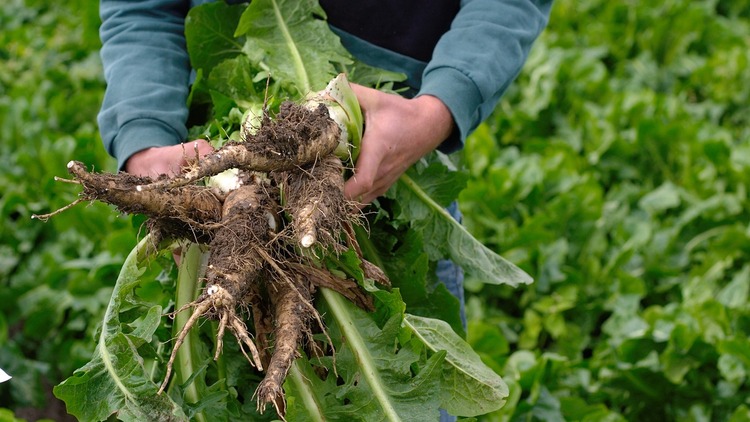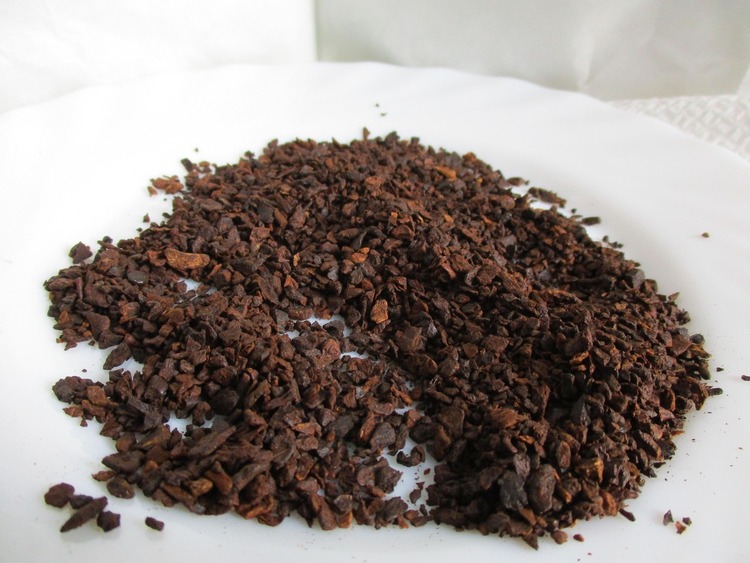Chicory root tea is made from the dried and roasted roots of the chicory plant, a blue-flowered perennial native to Europe. The beverage boasts a rich and earthy flavor, often compared to coffee, but without the caffeine jitters. In addition to its rich taste, chicory root tea has been linked to various health benefits, including improved digestion, heart health, and blood sugar management.
This article explores chicory root tea’s origins, taste, uses, and health benefits!
Please note: This article contains affiliate links, meaning I may earn a commission if you make a purchase by clicking a link. Of course, this comes at no extra cost to you and helps me keep offering readers solid information.

What is Chicory Root Tea?
Chicory root tea is a delightful herbal tea made from the dried and ground roots of the chicory plant (Cichorium intybus). This tea has gained popularity due to its particular taste and numerous health benefits.
The chicory plant is a perennial herbaceous plant with vibrant blue flowers often seen along roadsides or wild meadows. It is commonly known as common chicory or wild chicory. The roots of this plant are the central part used for making the tea featured in this article. Harvested, washed, and dried, they’re then roasted and ground, ready for you to steep and savor.
Chicory root tea offers a caffeine-free alternative to traditional teas and coffee.
Note: Some chicory varieties are cultivated for their leaves. These can be used in salads or cooked like other leafy greens. They taste slightly bitter, which pairs well with other ingredients like nuts, fruits, and cheeses.
The stems from chicory plants, often blanched to reduce bitterness, are also edible. They can be served raw or cooked (in a gratin or braised dish).
Chicory Root Tea Flavor Profile
Here are some of the key flavor components of chicory root tea:
- Earthy: Chicory root tea has a pronounced earthy flavor that is often described as similar to roasted coffee beans or dark, rich soil. This earthiness can be quite intense and is a defining characteristic of this tea.
- Bitterness: Chicory root tea can have mild to moderate bitterness, so it is often used as a coffee substitute. The bitterness is not as intense as coffee but is still present.
- Nutty: Some people detect nutty undertones in chicory root tea, which can add a pleasant depth and complexity to its flavor.
- Sweetness: Chicory root contains a natural sweetness that can be enhanced when roasted. This natural sweetness balances the bitterness and earthiness, making the tea more palatable.
- Roasted Notes: Roasting chicory root is a common process used to prepare it for tea. During roasting, chicory root can develop roasted or toasty notes similar to those in roasted coffee beans.
- Woody or Woody-Spicy: Some individuals also perceive subtle woody or woody-spicy undertones in chicory root tea, which can add to its complexity.
The flavor of the tea may vary depending on factors such as the source of the chicory root, the roasting process, and any additional herbs or spices added to the blend.
History and Origin of Chicory
Long ago, chicory root tea was cherished by various cultures around the globe. Its origins can be traced back to ancient Egypt, where it was widely used for its medicinal properties and as a wild edible plant. You might be fascinated that it was also a popular ingredient in traditional European dishes, especially in countries like France and Belgium.
In Europe, chicory was cultivated not only for its tasty leaves but also for its medicinal value. The plant’s roots were roasted and utilized as a coffee substitute during financial hardship, such as wars and famines. This practice gained prominence in the 19th century and has survived, with chicory still used to create caffeine-free coffee alternatives.
As the popularity of chicory spread, the United States also caught on to the plant’s potential. By the 1800s, chicory had established a firm presence in the US as a coffee alternative. It even became a staple ingredient in the quintessential New Orleans Coffee, Café du Monde’s Chicory Coffee.
In recent years, foraging for edible wild plants like chicory has regained popularity as people become more interested in connecting with nature and exploring alternate food sources. You can also participate in this growing trend by learning to identify and harvest chicory in the wild. Just remember to follow the principles of sustainable foraging to ensure the plant’s continued growth for future generations.

Chicory Root Blends
Chicory root is often blended with herbs, spices, and botanicals to create a variety of taste profiles and maximize health benefits.
Here are some popular blends:
Chicory and Dandelion Root Tea: This blend combines chicory and dandelion root with similar earthy and slightly bitter flavors. It’s often used as a coffee substitute and is believed to have digestive and detoxifying properties.
Chicory and Roasted Herbal Blends: Chicory root is often roasted, and when combined with roasted herbs like roasted barley or roasted chicory leaves, it creates a rich and dark infusion reminiscent of coffee. These blends are excellent for those looking to reduce their caffeine intake.
Chicory and Cinnamon Tea: Chicory root’s earthiness pairs well with the warm, sweet notes of cinnamon. This blend offers a delightful balance of flavors with a hint of spice.
Chicory and Vanilla Tea: The natural sweetness of chicory root can complement vanilla’s creamy, sweet flavor. This blend is often enjoyed with milk or cream for added richness.
Chicory and Spiced Chai: Combining chicory root with traditional chai spices like cinnamon, cardamom, cloves, and ginger creates a flavorful and aromatic tea with a hint of warmth and spice.
Making Chicory Root Tea
Preparing chicory root tea is a relatively simple process. You can follow the steps described below.
Ingredients
- Dried chicory root or chicory root granules
- Fresh, cold water
- Optional: sweeteners like honey or sugar, milk or cream, and additional spices like cinnamon (to taste)
Instructions
- Measure the Chicory Root: Use 1 to 2 teaspoons of dried or chicory root granules per 8 ounces (1 cup) of water. Adjust the amount to your taste preferences, starting with a smaller amount if you’re new to chicory root tea and increasing it as needed.
- Boil Water: Heat fresh, cold water in a kettle or stovetop. You’ll need enough water to make the desired amount of tea.
- Add Chicory Root: Place the dried chicory root or chicory root granules in a teapot, tea infuser, or directly in the cup or mug you plan to use for brewing.
- Pour Hot Water: Carefully pour the water over the chicory root in your chosen container once it reaches a rolling boil.
- Steep: Cover the container with a lid or saucer and let the chicory root steep in the hot water. The steeping time can vary but typically ranges from 5 to 10 minutes. You can adjust the steeping time to achieve your desired strength and flavor.
- Strain: If you used loose chicory root, strain the tea into your cup to remove the chicory root particles. If you used an infuser or tea bag, remove it from the cup.
- Add Extras (Optional): Customize your tea by adding sweeteners like honey or sugar, milk or cream, or spices like cinnamon. Adjust the additions to suit your taste.
- Enjoy: Your tea is now ready to enjoy!

Chicory Root Tea Health Benefits
Chicory root tea is packed with multiple health benefits for you.
One of its main components is inulin, a soluble fiber and prebiotic that can help improve digestive health. Inulin promotes the growth of beneficial gut bacteria and can relieve constipation. Moreover, chicory root tea is known for its antioxidant properties that may help combat oxidative stress, significantly protecting your body from harmful free radicals.
As a bonus, the tea possesses anti-inflammatory properties and has been found to regulate blood sugar levels and improve blood sugar control. The presence of adiponectin helps enhance insulin sensitivity.
Additionally, the tea has ingredients that contribute to a healthy liver. Studies suggest it may reduce inflammation and oxidative stress in the liver, promoting its overall health. Drinking this tea can also be helpful for people managing osteoarthritis, as it has been shown to decrease cortisol levels and inflammation in the body.
When it comes to nutrients, this tea is a powerhouse. It contains vitamins A, B, and C and essential minerals like manganese. Furthermore, chicory root tea has a reasonably low-calorie count and consists of dietary fiber and protein, making it a great addition to your weight loss journey.
Where to Buy and How to Store
You can find chicory root tea in various forms, such as powder, roots, and even as a sweetener. To purchase chicory root products, visit your local health food store, supermarket, or online retailer.
- Powder: Chicory root powder is commonly used as a coffee substitute. Look for it in your local supermarket’s coffee or tea aisle or online.
- Sugar: Chicory root sugar, a natural sweetener, may be available in specialty food stores or online.
- Sweetener: Chicory root can also be found as a sweetener in products like creamers and dessert toppings.
- Roots: To buy whole chicory roots, check with your local farmers’ market or online retailers specializing in herbs and dried goods.
- Cream: Some dairy-free creamers use chicory root as a base ingredient. Seek them out in the dairy aisle or with vegan and lactose-free products.
If you want to purchase this tea online, please take into consideration the following recommendations:
Anthony’s Instant Chicory Root

Anthony’s Organic Roasted Chicory Root Granules

New Orleans Roast 100% Pure French Chicory

Proper storage is essential to ensure the freshness and quality of your chicory root tea. Follow these simple tips to keep your chicory root products fresh:
- Keep it dry: Store the chicory root products in a cool and dry place, away from direct sunlight and moisture.
- Airtight containers: Use airtight containers to prevent exposure to air, as it may cause the product to lose its flavor and potency.
- Proper labeling: Label the containers with the date of purchase and any necessary additional information so you know their age and appropriate use.
- Away from strong odors: Chicory root can absorb odors. Please keep it away from strong-smelling foods or cleaning supplies to maintain its natural taste.
Frequently Asked Questions
What does chicory root tea taste like?
Chicory root tea has a unique flavor that many people find enjoyable. It has a slightly sweet, nutty taste with an earthy undertone and a hint of bitterness. If you’re looking for an alternative to your regular tea or coffee, chicory root tea is worth a try.
Where can I buy chicory root tea bags?
Chicory root tea bags can be found at most health food stores, supermarkets, or online retailers. Check the label to ensure you’re buying pure chicory root tea or a blend with chicory root as a primary ingredient.
Is there any caffeine in chicory root tea?
No, this tea is naturally caffeine-free. It is an excellent alternative for those looking to reduce their caffeine consumption or looking for a relaxing beverage to enjoy throughout the day.
What are the benefits of organic chicory root tea?
Choosing organic tea ensures that the chicory roots used in the tea have been grown without synthetic pesticides or fertilizers. This can be better for your health, as well as for the environment. Organic tea is also known to contain high levels of inulin, a fiber that supports digestive health and overall gut function.
What is the difference between chicory root tea and chicory root coffee?
Chicory root tea is made from steeping dried, roasted chicory roots in hot water. In contrast, chicory root coffee blends roasted chicory root and traditional coffee beans. While both beverages feature chicory’s unique flavor profile, chicory root coffee has a more robust and bold flavor due to the coffee beans.
Can I mix dandelion and chicory root in tea?
Yes, you can mix dandelion and chicory root in tea. Both herbs have complementary flavors that can be combined to create a delicious and nutritious beverage. To make this blend, steep equal parts of dried dandelion root and chicory root in hot water. This combination can offer additional health benefits, such as improved liver function, digestion support, and a delightful taste.

I hope you have enjoyed the article! See you next time!
Have you tried this tea?
More About Herbal Tea
What Does Burdock Root Tea Taste Like?
What Does Mullein Tea Taste Like?
What Does Raspberry Leaf Tea Taste Like?
What Does Mugwort Tea Taste Like?
What Does Honeybush Tea Taste Like?